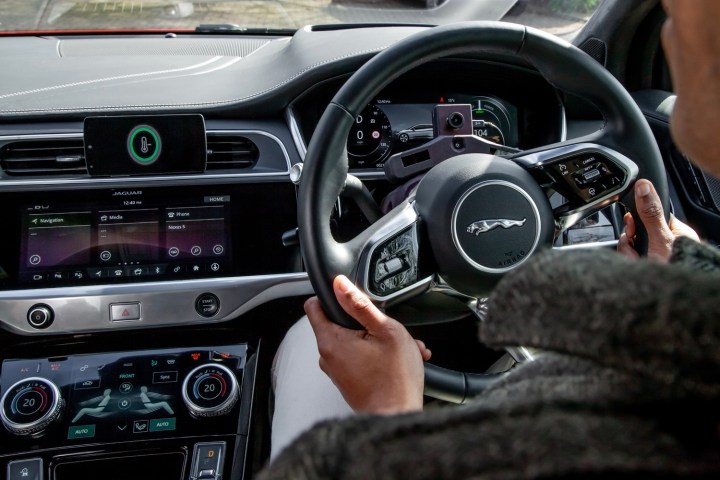
Driving can often be one of the most stressful parts of a day, but what if your car could help you relax? Jaguar Land Rover (JLR) hopes to use artificial intelligence (A.I.) to make that happen. The British automaker is testing a system that can adjust cabin settings to help de-stress drivers. JLR also believes this technology could be useful in self-driving cars.
The experimental system uses a driver-facing camera and special software that analyzes facial expressions to determine the driver’s mood. The system can automatically adjust things like climate control and ambient lighting to create a more soothing environment. It could also lower the cabin temperature if the driver yawns or shows other signs of tiredness, according to JLR, or even select a certain playlist to suit the driver’s mood.
JLR is also testing a version of the system designed for rear-seat passengers. It uses a camera mounted in a headrest, according to JLR. Because someone else is doing the driving, the system doesn’t try to keep rear-seat occupants alert if it detects tiredness. It’s designed to do the opposite, dimming lights, tinting the rear windows, and raising the temperature in order to help people get to sleep more easily.
“As we move towards a self-driving future, the emphasis for use remains as much on the driver as it ever has,” Dr. Steve Illey, JLR chief medical officer, said in a statement. “By taking a holistic approach to the individual driver, and implementing much of what we’ve learned from the advances in research around personal well-being over the last 10 or 15 years, we can ensure our customers remain comfortable, engaged, and alert behind the wheel in all driving scenarios, even monotonous motorway journeys.”
The mood-detection system is just an experiment right now, but it could find its way into future Jaguar and Land Rover production cars. The company is testing a number of ideas as part of its “tranquil sanctuary” concept, with the goal of using technology to improve driver and passenger comfort and well being. Another recent project involved using heated steering wheels to convey navigation directions.
JLR isn’t the only automaker dabbling in mood-sensing technology. Kia demonstrated its own experimental mood-detection system at CES 2019. The foundation for such a system is already in place in the form of the driver-attention monitors already being used by JLR and other automakers. Some automakers, including BMW, Cadillac, and Subaru, are already using driver-facing cameras to detection distraction. Volvo plans to put them in every car it makes beginning in the mid-2020s.


